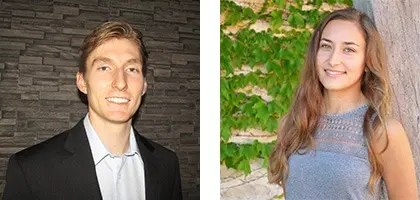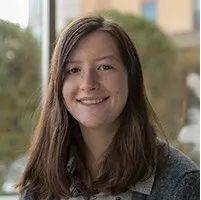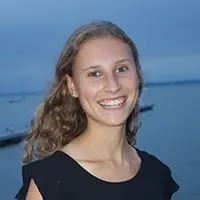 Alex Yost and Ana Diges
Alex Yost and Ana Diges
Five undergraduates in the University of Wisconsin-Madison College of Engineering are working on projects on three continents that have received 2020-21 Wisconsin Idea Fellowships.
The projects, sponsored by the Morgridge Center for Public Service at UW-Madison, address needs identified by community partners.
Alex Yost, a chemical engineering major, and Ana Diges, a materials science and engineering major, are leading an Engineers Without Borders project to install a water treatment and distribution system in Camarones, Ecuador, to provide a safe and reliable water supply year-round to 500 people in a rural community. By working with the Camarones Water Committee, the students aim to implement a water supply design that meets community priorities, ensuring community ownership. Daniel Wright, an assistant professor of civil and environmental engineering, is their faculty adviser.
 Abigail Lawrence
Abigail Lawrence
 Taylor Rosenthal
Taylor Rosenthal
Abigail Lawrence, a chemical engineering major, and Taylor Rosenthal, a mechanical engineering major, are part of a team that’s working with Lesley Sager, a faculty associate in the School of Human Ecology, and Madison-based design firm Delve. The group’s biomass briquette stool project serves to mitigate deforestation in Kenya by developing a biomass briquette machine that would create a more sustainable fuel alternative to wood. The student team designed a stool that was trialed over the winter of 2020. Next, the students will install the biomass briquette stool in local primary schools and train students and staff to use the machine.
 Jan Wodnicki
Jan Wodnicki
Industrial engineering major Jan Wodnicki is working with Christian Medical College Vellore Hospital in India to develop a machine learning algorithm that can be used to predict the risk of ulcer formation in diabetic individuals and improve the time to initiate treatment. Under the advisement of Justin Boutilier, an assistant professor of industrial and systems engineering, Wodnicki and a team of undergraduate engineers are designing a portable thermal imaging booth to collect further thermal imaging data. Jan will travel to India to collect data to inform the first risk-assessment technique for detecting diabetic foot ulcers and preventing diabetic foot amputations.
The fellowship program is in its 22nd year and offers both logistical and financial support.